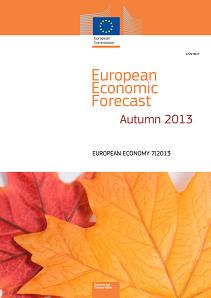European Commission, (2013), European Economic Forecast – Autumn 2013, Brussels: European Commission. The EU economy has returned to positive GDP growth. Following a slow and still vulnerable expansion of economic activity during the remainder of 2013, growth is set to become gradually more domestic demand-driven and more robust in the course of 2014 and into 2015. The legacy of the crisis-deleveraging, financial fragmentation, elevated uncertainty and rebalancing needs – will …Read More
The Cypriot Economic Collapse
Pegasiou, A., (2013), “The Cypriot Economic Collapse: More Than a Conventional South European Failure”, Mediterranean Politics, Volume 18, Issue 3, pp. 333-351. In trying to assess the causes behind Cyprus’s request for a financial bailout, the paper takes a step back and reviews the economy of the island within a comparative political economy framework. With reference made to varieties of capitalism (VoC) literature, the paper sets a twofold target. Initially, …Read More
EU 2013 Report on Policy Coherence for Development
European Commission, (2013), “EU 2013 Report on Policy Coherence for Development”, Commission Staff Working Document, SWD(2013) 456, October. Τhe European Commission published its report on policy coherence for development which lays out the progress made by the EU and its Member States in ensuring that their action in areas such as trade, agriculture, security or migration is in line with the goal of overcoming poverty in developing countries. The report …Read More
What’s wrong with Europe?
Rota Baldini, I. and Manasse, P., (2013), “What’s wrong with Europe?”, VoxEU, 04 November. Unlike the US, Europe is struggling to recover from the crisis. This is especially the case in certain European countries. This column discusses why the process of convergence in the Eurozone has slowed down. It proposes a way for European institutions to cope with the structural problems – with individual country-level reforms and a federal budget. …Read More
Quarterly Report on the Euro Area
European Union, (2013), Quarterly Report on the Euro Area, Volume 12, No. 3, pp. 1-34. The volume contains: Focus: Financial dependence and growth since the crisis. [here] Labour costs pass-through, profits and rebalancing in vulnerable Member States. [here] Cross-border spillovers in confidence. [here] The focus section takes a look at the relationship between growth and finance at the level of industrial sectors and shows that more developed financial markets have, …Read More
Europe’s Elusive Growth Consensus
Pisani-Ferry, J., (2013), “Europe’s Elusive Growth Consensus”, Project Syndicate, 31 October. In most European countries, GDP per capita is currently lower than it was six years ago. In some cases, like Greece, Italy, and Ireland, it is more than 10% lower. Even in Germany, where it is higher, average growth over the last six years has been anemic. It is hard to overestimate the adverse consequences of this state of …Read More
Fawlty Europe
Charlemagne, (2013), “Fawlty Europe”, The Economist, 01 November. “DON’T mention the war” is the catchphrase from one of the best-loved scenes in “Fawlty Towers”, a British television comedy series. John Cleese plays the eccentric owner of a small-town hotel who causes uproar by incessantly and rudely talking about the war to his German guests. These days in Brussels the equivalent catchphrase about Germans has been “Don’t mention the surplus”. It …Read More
Statistics Show Bailout Countries’ Slide Away from EU Targets
Stevis, M., (2013), “Statistics Show Bailout Countries’ Slide Away from EU Targets”, The Wall Street Journal, 29 October. Euro-zone countries in bailout programs have slipped away from the European Union’s targets for economic and social performance, a number of detailed statistical indicators show. The backtracking was made evident Tuesday when Eurostat, the EU statistics agency, presented aggregated data on a set of goals that form Europe’s 2020 Strategy. The program …Read More
Blogs review: The comparative performance of fixed and flexible ER regimes
Cohen-Setton, J., (2013), “Blogs review: The comparative performance of fixed and flexible ER regimes”, Bruegel, 29 October. Andrew Rose recently published a provoking paper, which shows that the choice of the exchange rate regime has had little influence on economic outcomes in the Great Recession. While the empirical analysis of the paper excludes EMU countries, this result has challenged the consensus that life outside the euro would have been easier …Read More
Crisis knocking EU 2020 goals off track
Mahony, H., (2013), “Crisis knocking EU 2020 goals off track”, EUObserver, 29 October. The economic crisis has knocked the EU’s longterm strategic targets off track with planned poverty-reduction and employment goals unlikely to be met by 2020. “Without adequate policy measures to rapidly reverse this escalating poverty trend, the EU risks moving away from the Europe 2020 headline target on poverty,” said a Eurostat report, published Tuesday (29 October) on …Read More





